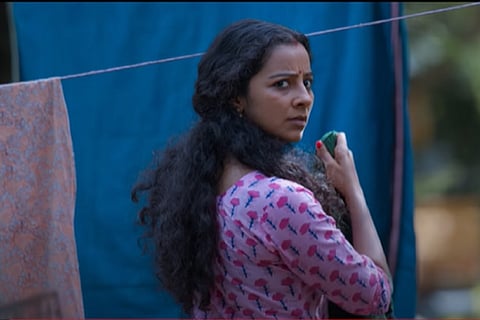

The Darshana-Basil shoulder dance bit from Jaya Jaya Jaya Jaya Hey that went viral before the movie came out is not included in the movie. But those few seconds – Basil dancing, moving his shoulders up and down and forcing an annoyed looking Darshana to do the same – capture the entire mood of the film very well. Jaya Jaya Jaya Jaya Hey, written and directed by Vipin Das, focuses the lens on the life of Jaya, a girl growing up in a very typical lower middle class family, and effortlessly shows the amount of unfairness in a woman’s life that’s taken for granted.
The casting is absolutely apt, you know when you see a curly-haired little girl run through the fields and turn to show a very Darshana-like face. Glimpses of her childhood show two sides of the story of raising a girl. “I will raise her like Nehru raised Indira Gandhi,” says the father holding the newborn, and the uncle quips, “But make sure she has long hair, or else no one will marry her.”
Vipin Das, along with his co-writers Nashid Mohamed Famy and Ajith Kumar, has neatly picked and arranged specific moments of the life of a girl growing up into a young woman, to show the many different ways she gets the short end of the stick. When she asks for a teddy bear, she gets the toy car her brother had played with. When she wants to do a degree in Anthropology, the same uncle who had advised to keep her hair long directs the family to the local parallel (private unaffiliated) college. Not that Jaya never asserted herself, but no one paid attention to her.
Rajesh (Basil Joseph) is also written as a typical middle class man, busy with his chicken business and indifferent towards the women in the family. His aged mother (in a superb performance) has to press idiyappam out of the maker every morning because that’s the only dish he eats. He calls his sister ‘thadicihi’ (fat woman) and when he speaks to Jaya during a formal marriage proposal, he talks about chicken prices. You very easily accept him as the stereotype of a man who considers it beneath him to show a soft side.
Watch: Trailer of the film
Basil, who ran around a terrace as a drunk and depressed man in Janeman and played the fun guy with many responsibilities in Dear Friend, is unidentifiable as Rajesh, no trace of fun or frolic in his serious face. He even gets the Kollam dialect right. For Rajesh, domestic violence is so acceptable that he thinks it’s enough if he says sorry and takes the aggrieved person out to eat his favourite meal – idiyappam and chicken.
Darshana, having proven her talent with very varied roles in a short time, does not really surprise you when she becomes the familiar image of a woman who has always been denied her dreams. In loose fitting kurtas and hardly any make-up, she turns into the young woman who has to accept the unfairness meted out to her at every stage of life because of her gender. A woman who is not expected to have new books or study well or think of higher studies or a job or even the basic safety against domestic abuse.
When Jaya calls home fearing that she would be beaten, her mother says that is normal in a woman’s life while her father is too busy with his tea to listen. The hypocrisy of such ‘caring’ guardians is shown through a comic portrayal of wailing relatives the day Jaya leaves home for her husband’s place. She looks shocked to see their faces, none of which had a shred of kindness before that day. At the marital home, she notices the many broken things, fixed and taped together, like a warning of what her life would be. Ankit Menon’s music helpfully fills in the blanks in these moments; there’s also a nice little song for Jaya’s feelings.
All of it, Jaya’s growing up years, her entry and experience in the marital home, happen so soon that you know there is going to be a reaction, a long pending one, from her. Despite the lack of any support from anyone in her family, she smartly uses the tools that she has as a modern young woman. Jaya’s uprising is very rewarding, like a sip of cold water on a very hot day. But from that point, you are also very aware of how it is all fiction, a wannabe tale or a favourite daydream for many suffering women.
Even though it does not stick to the reality of a woman’s life that the script had so far paid close attention to, it is still an appreciable offering, especially coming from three male writers. It is nice to see them take digs at men, making caricatures of them through some wonderful actors like Azees Nedumangad, Sudheer Paravoor and Anand Manmadhan.
Disclaimer: This review was not paid for or commissioned by anyone associated with the series/film. TNM Editorial is independent of any business relationship the organisation may have with producers or any other members of its cast or crew.